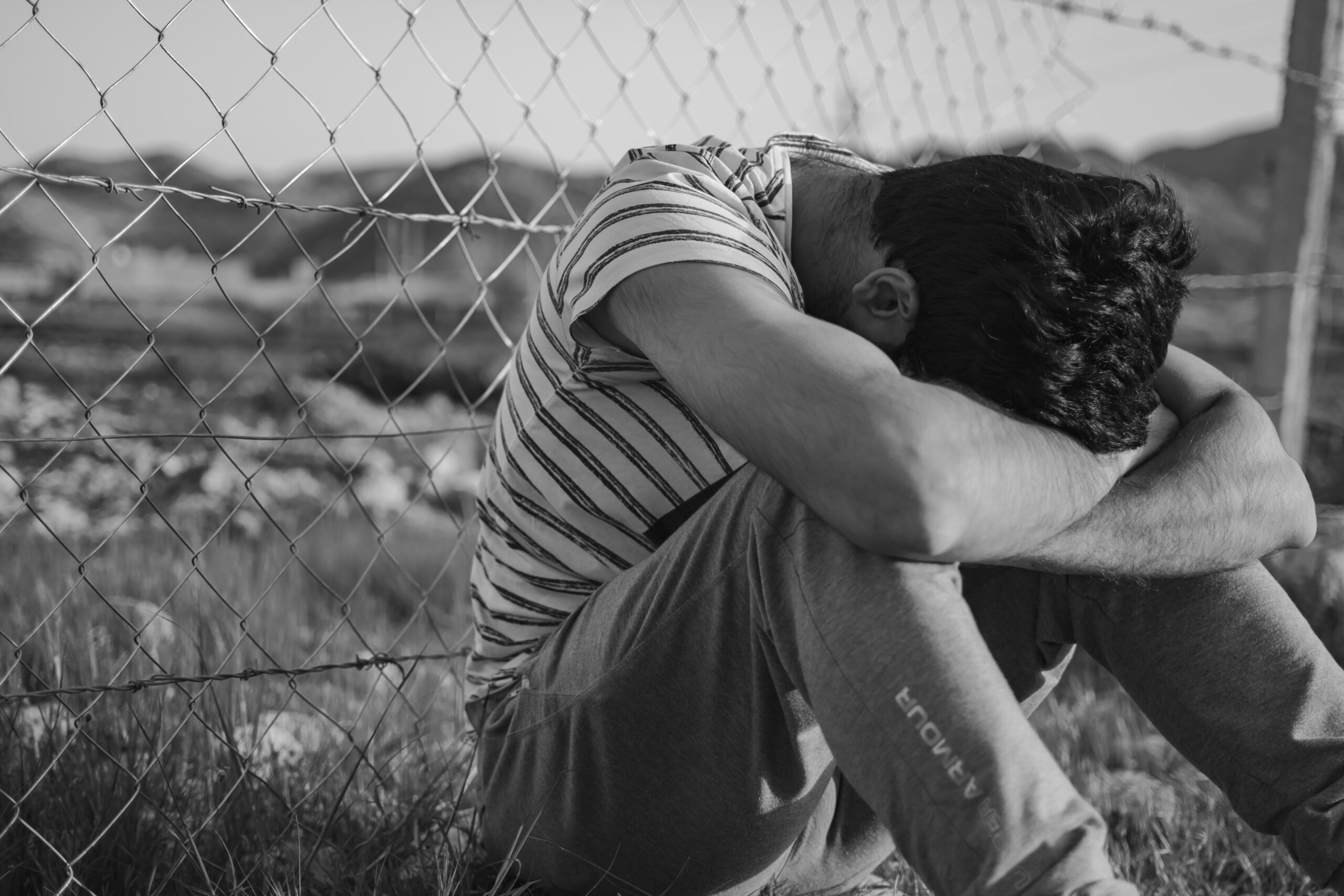Sitting in the park with friends we haven’t seen in months, the conversation drifts to whether we are morning people (early risers) or night people. Born a morning person, Barry smirks with a slight sense of moral superiority that he is awake and alive to more hours in his day than me. Then with a sigh he observes that I appear to be neither a morning nor a night person. I guess that makes me a noon person – bring on the long lunch! I might even nap after it!
Perhaps I sleep because I couldn’t be bothered anymore. A deep weariness/fatigue has set in. Even writing this blog is an effort. I ask myself who wants to read it anyway? It helps to know there’s a name for this malaise in the mental health field called “languishing” and it is particularly relevant during COVID-19 lockdowns. According to the APA Dictionary of Psychology (VandenBos, 2007), languishing is characterised by “ennui, apathy, listlessness, and loss of interest in life.” Prolonged lockdowns have plunged us from an initial state of heightened anxiety into a profound lack of motivation. Normally I plan and our calendar is filled with upcoming events. I tried to plan a few nice things but when I had to continually suspend or cancel them, I stopped planning. As lockdown endures indefinitely, I rise later each day asking what’s the point?

Source: Photo by Zoe on Unsplash
I’m not alone. In case you haven’t seen the news lately, the world has a few problems! The past two years of COVID-19 have been brutally challenging for many. The words of Tolkien’s hobbit Frodo to the wizard Gandalf resonate:
“I wish it need not have happened in my time,” said Frodo. “So do I,” said Gandalf, “and so do all who live to see such times. But that is not for them to decide. All we have to decide is what to do with the time that is given us” (1965, p. 50).
As I talk with people across cultures and generations (over Zoom of course and who’d ever heard of it before our first lockdown?), especially people helpers, hope seems to be in short supply. Those who live with broken hearts could distract more easily before the pandemic. Now there’s no escaping the pain. Many people also report feeling dead and hollowed out (we call it “zoomed out”), feeling like a shell of their former thriving, flourishing self. Over the past few months I’ve been asked a plethora of questions such as: What is God up to in the world? Where is He in all this hurt and pain? What do we do with our unsettling feelings of powerlessness in the midst of so much political upheaval, reactivity and dysregulation? How can we keep from growing bitter and increasingly polarized during a time like this? How can we stop trying to find an enemy to blame because we are overwhelmingly stressed? How can we stop becoming the enemy? It seems our collective hearts are sad and tender. How do we find balance when the world constantly shifts beneath our feet and we lose our footing?
Alas, at last there is a glimmer of hope. Spring has lightened our hearts with beauty and a taste of God’s glory. And there is finally light at the end of the long, lockdown tunnel. We just hope it is not the light of an oncoming freight train! Interestingly, the refrain has shifted to the unexpected benefits of slowing down – do I really want to return to a manic, hectic pace of life? All of this causes me to wonder: How can I cultivate the spiritual stirrings underlying uncertainty in myself and others?
Good News
It’s time we heard some good news: Jesus came to heal burdened, battered and broken hearts. He came to restore hope and wholeness through our hollowed out, broken places. In Luke 4:17-21 He said:
The Spirit of the Sovereign Lord is on me, because the Lord has anointed me to proclaim good news to the poor. He has sent me to bind up the brokenhearted, to proclaim freedom for the captives and release from darkness for the prisoners, to proclaim the year of the Lord’s favour and the day of vengeance of our God, to comfort all who mourn, and provide for those who grieve in Zion – to bestow on them a crown of beauty instead of ashes, the oil of joy instead of mourning, and a garment of praise instead of a spirit of despair. They will be called oaks of righteousness, a planting of the Lord for the display of his splendor. They will rebuild the ancient ruins and restore the places long devastated; they will renew the ruined cities that have been devastated for generations.
The expressions “burdened”, “battered” and “brokenhearted” are not metaphors like when Jesus says, “I am the vine.” In Hebrew, the word for “brokenhearted” literally means “shattered or to crush” (Strong’s Hebrew, n.d.). In Isaiah 27:11 God uses the same word to describe a dry bush with dry twigs that snap or the breaking of a branch. Isaiah 21:9 uses the same word to describe the idols of Babylon that lie shattered on the ground. Also, Isaiah 38:13 uses the word to describe a broken bone. If you have ever broken or shattered a bone, you know how much it hurts. Likewise, the heart can be shattered and broken – literally. It hurts! In fact, Jesus assumes we have broken hearts. But a broken heart is not something we readily embrace. If truth be told, we run from it, but avoidance only robs us of hope and increases our pain.
 Source: Photo by Roman Bilik on Unsplash
Source: Photo by Roman Bilik on Unsplash
If God’s desire is to heal our broken hearts, what makes us hesitate? Perhaps our experiences of spirituality did not take our broken places into consideration and further wounded us. Or could it be a realisation that when we turn away (my survival strategy to protect myself from the shame of feeling unworthy), we leave a litany of abandoned relationships in our wake. Our self-protection means that in order to stay safe, conflict and anger are to be avoided at all costs and we leave others with no chance to explain or repair the relationship. We do a “runner”! We also do a “runner” from the presence of God.
There are many things that can only be seen through broken hearts and eyes that have cried. Psalm 34:18 expresses what King David deeply knew in his heart, “The Lord is close to the brokenhearted and saves those who are crushed in spirit.” The Bible contains numerous verses on healing broken hearts and crushed spirits:
- “He heals the brokenhearted and binds up their wounds” (Psalm 147:3).
- “Heal me, Lord, and I will be healed; save me and I will be saved, for you are the one I praise” (Jeremiah 17:14).
- “You made me suffer a lot, but you will bring me back from this deep pit and give me new life. You will make me truly great and take my sorrow away” (Psalm 20:20-21, CEV).
- “Come to me, all you who are weary and burdened, and I will give you rest” (Matthew 11:28).
- “Do not fear, for I have redeemed you; I have summoned you by name; you are mine. When you pass through the waters, I will be with you; and when you pass through the rivers, they will not sweep over you. When you walk through the fire, you will not be burned; the flames will not set you ablaze. For I am the Lord your God, the Holy One of Israel, your Savior… Since you are precious and honored in my sight, and because I love you…” (Isaiah 43:1-4).
It is incomprehensible to conclude that God has no interest in healing hollowed out, broken places. Matthew 9:35-38 (MSG) records, “Then Jesus made a circuit of all the towns and villages. He taught in their meeting places, reported kingdom news, and healed their diseased bodies, healed their bruised and hurt lives. When he looked out over the crowds, his heart broke…” It is important to honour our bruised and hurt lives; our brokenness and tears. Jesus does!
Broken Open
 Source: Photo by CHUTTERSNAP on Unsplash
Source: Photo by CHUTTERSNAP on Unsplash
Someone once said that your heart has to keep breaking until it opens. How does my heart open? How do hope and joy find me again? My heart keeps breaking until I let go of everything that is not the real me. When my heart opens there is a letting go of the false self, the false beliefs about God and where to find life, the self-protective strategies I cling to that keep my heart safe. I become more of who I truly am. I recover my lost soul. I discover the Author of Life.
Often, this happens while I am ministering to others. Several years ago, while teaching developmental attachment in an underdeveloped country, the sharing of stories began in earnest. I remember the scene as if it is happening now. Many in the room appear lost, broken and numbed-out. Desire has long ago been deadened. Yet, today I witness a softening. Self-protective strategies and the vows made to never again let anyone in again to hurt, sting and wound are being challenged. I know that place. I know what it is to become cold and hard while trying to protect against further relational injury. I know how to shut down the heart, to deaden desire.
I also know the deep joy of emotional healing in my hollowed out, broken places. I share it with these participants in a way that reveals a God who is able to use the very worst things in our lives to bring about the very best things. I stand before this group and let them see my scars that once were open, gaping wounds. Hurt people hurt people, just as healed people can become wounded healers.
One by one they creep towards me during each break, tentatively pleading for me to spare a moment to talk. They are ploughed up and tender. Barry and I have shared how our wounds nearly destroyed us and how the enemy tried to use them to take us out. We also radiate hope. I discern in the participants a craving for instant healing to ease the pain they can no longer repress. I tell them they need to sit with the pain a while longer, so they will know how to connect with another in pain. I tell them I know that in time the process will make them beautiful; how their mess will become their message.
It is the final session. They were invited to bring childhood photos. I ask them to hold their photo in their hands. We pray a prayer of healing over them, that they will renounce and leave behind the old names, messages, self-images and destructive self-talk that has kept them imprisoned. We pray that God will sing new names over them; life-giving names that will renew and restore them to His original design. This is what we do when we love people – we do not thwart their breaking, rather, we help them to bring their wounds to the Wounded Healer.
A young woman yields a powerful drawing. One side is dark and the other is Light. She draws herself standing on the side of Light and shares how Jesus gently invited her to come out of a dark place into His Light. She tells how she initially refused Him, afraid to open her bruised heart again. But Jesus’ unrelenting pursuit brought a surrender. Tears spill from her radiant eyes in the telling. My heart splits open and love falls out.
Another young woman tentatively takes the microphone. Yesterday she shared her story, how from an early age she was told her father worked overseas. At ten years old she accompanied her mother to the temple where her broken and despairing mother tried to kill one of the priests with a knife. Watching her being restrained by other monks, the young girl’s realisation of her parentage broke over her. In that moment, hate engulfed her heart, for a monk is allowed father children who are never acknowledged. The hatred consumed her and then she also lost her mother. With so little money to live on, her mother chose an overseas job to support her children. The girl’s pleas for her mother to come home were initially successful. But she soon left again, leaving her daughter’s heart crushed and broken.
Now, tears spill over as she tells how her heart, consumed by hatred and bitterness, shut down and she fell into a deep depression. Today her face glows as she shares how Jesus has come for her heart and she is finally free. As she talks I cannot hold back my tears of joy for her. For a moment we lock tear-stained eyes, truly seeing into each other’s souls; a glimpse of broken to broken, mended to mended. We are both freed hostages; sisters to our spiritual brother Jesus, who bought us with His own life. I still carry her softly in my heart.
Then a man takes the microphone. He speaks quietly, humbly declaring his brokenness, how he despaired of life, how the message of worthlessness invaded his whole being. He shares how the seeds of wholehearted surrender are yielding tentative shoots. I tell him how brave he is to let himself be seen; how there is no more being sorry for who he is; no more slow death by self; no more listening to the enemy’s lies about himself; for when you abdicate yourself, you cannot welcome the Lover of your soul.
 Source: Photo by Mojtaba Ravanbakhsh on Unsplash
Source: Photo by Mojtaba Ravanbakhsh on Unsplash
Others share their gratefulness and my heart swells with hope, knowing that my former pain and suffering informs who I am now and is a catalyst for healing in this corner of the world. I am finding wholeness through my hollowed out, broken places. I gather up my joy as I gather my things that are strewn around the room and stuff them into my suitcase. I’m coming home with a full heart. Robert Alden’s words resonate, “There is not enough darkness in all the world to put out the light of even one small candle” (cited in Mulcahy, 2018). A deep and powerful sense of purpose occupies my heart!
The Promise of God’s Presence
To find wholeness through our hollowed out, broken places during this prolonged pandemic is to recover hope, joy and motivation. There are some things I keep stubbornly believing and one of them is that hope is the absence of fear that is based on the promise of God’s presence. I tend to forget this when my heart hurts and I suspect you do too.
A story recorded in 2 Chronicles 20:2-4 gives me hope for myself and a world in pain. Some people come and tell King Jehoshaphat that a vast army is arrayed against them. The armies are advancing at an alarming rate. In response, the people of Judah are overwhelmed and paralysed with fear. Much like COVID-19 today, they are facing seemingly insurmountable problems and situations. What is their first response to crisis?
Panicked, King Jehoshaphat looks out at the mess that the people of God are in and the fact that they are in grave danger. His first response is to cry out to God and he encourages all the people to fast and pray. The Bible tells how the people of Judah “came together to seek help from the LORD; indeed, they came from every town in Judah to seek him” (2 Chronicles 20:4). While they are gathered together praying big, bold prayers, the Spirit of prophecy comes upon a Levite named Jahaziel and he pronounces:
Listen, King Jehoshaphat and all who live in Judah and Jerusalem! This is what the Lord says to you: “Do not be afraid or discouraged because of this vast army. For the battle is not yours, but God’s. …You will not have to fight this battle. Take up your positions; stand firm and see the deliverance the Lord will give you, Judah and Jerusalem. Do not be afraid; do not be discouraged. Go out to face them tomorrow, and the Lord will be with you” (2 Chronicles 20: 14a-15, 17).
Based on this prophetic word, the people rise the following morning and march onto the battlefield led by a choir of hope singing praises to God. God delivers his people that very day (20:21).
The promise of God’s presence as a source of hope and wholeness is a familiar refrain that echoes across the whole Biblical story. God said to Joshua, “As I was with Moses, so I will be with you; I will never leave you nor forsake you” (Joshua 1:5). God declared to Gideon, “The Lord is with you, mighty warrior” (Judges 6:12). An angel says to Mary, “Do not be afraid… The Lord is with you” (Luke 1:28). And Jesus says to us, “Surely I am with you always” (Matthew 28:20). This is cause for hope to those who are hollowed out and brokenhearted in a shattered world.
 Photo by Ben White on Unsplash
Photo by Ben White on Unsplash
This morning I rise before my husband, a rare occurrence! Sunlight filters through my favourite tree, ripe with promise. The air is filled with sweet birdsong. I drink in the presence of God that flows through my hollowed out, broken places.
Closing Thoughts…
Jesus came to heal burdened, battered and broken hearts and to restore hope and wholeness in our hollowed out, broken places. The Bible speaks to broken hearts and if we allow, suffering can open our hearts so that hope and joy can find us. Our hearts will keep breaking until we let go of everything that is not authentic, especially our self-protection. Finding wholeness through our hollowed out, broken places means recovering hope and increasing motivation, based on the promise of God’s presence with us as He continues writing and perfecting our story.
A Declaration…
I declare that when I pass through the waters, God promises to be with me; therefore, I believe and declare he is with me now. I declare that when I pass through the rivers, they shall not overwhelm me; when I walk through fire I shall not be burned, and the flame shall not consume me because God is with me (Isaiah 43:1).
A Prayer…
Master God, thank You that You are writing a story of great adventure with my little life. I yield to the challenges, the shadows and even the necessary pain. I trust You to bring me home eventually, like the Hobbits to the shire with a song to sing and a story to tell. Help me to fix my eyes on Jesus, the author and finisher of my faith, and the author and finisher of my story (adapted from Lectio 365 and Hebrews 12:2, KJV.)
Reflect…
Sitting comfortably, take a deep breath in through the nose, and out through the mouth. As you breathe out, close your eyes or focus on a spot on the floor. Think of a time when God met with you and you were filled with hope. Contemplate the thoughts and feelings that arise… Notice where hope is located in your body and how it feels…
Now, starting at the top of the head, gently scan down through your body, noticing where you feel burdened, battered or brokenhearted… You are not trying to change anything, just notice where you hold these feelings in your body feels as you scan… If more than one sensation arises, choose one and contemplate its texture and qualities. Is it warm or cool? Is it moving or still? Can you give it a colour, a shape, a texture? When you have this image firmly in your mind, come back into the present and open your eyes.
Take time to draw what you saw. When you have finished your drawing, answer the following questions:
· Can you name your drawing? (Write it at the top of the page.)
· What feelings emerge? (Write them down the edge of the page.)
· What memory/s emerge?
· What do the colours represent?
· How are the shapes significant?
· What message does the drawing have for you?
· What do you want to talk to God about?
About the author: Dr. Paula Davis is a clinical counsellor, supervisor and educator specialising in psychological trauma. She has worked in higher education over many years as senior lecturer in counselling. Along with her husband she designs and delivers marriage enrichment/education programs in Australia, Africa, Sri Lanka, India and Europe.
References:
Lectio 365. 24-7 Prayer, mission and Justice. Retrieved from https://www.24-7prayer.com/dailydevotional
Tolkien, J.R.R. (1965). The fellowship of the ring. London: Betty Ballantine.


0 Comments